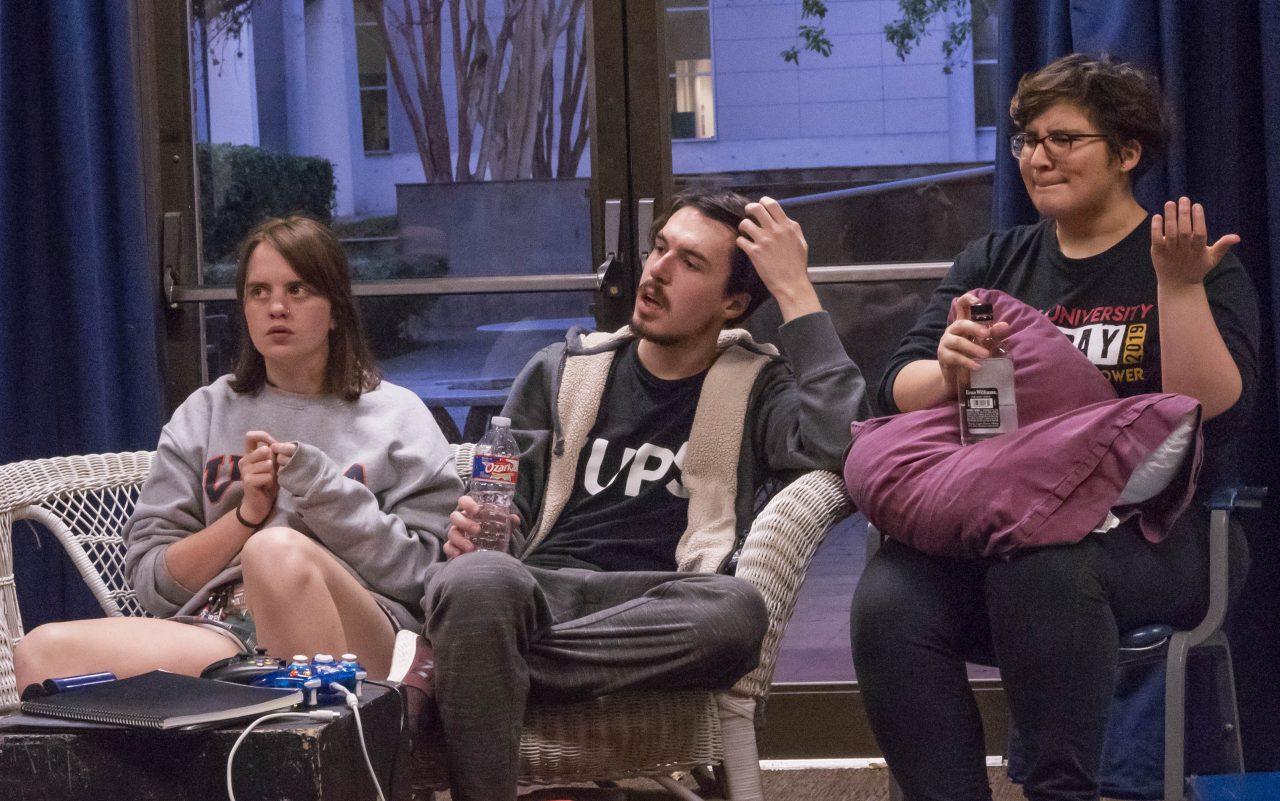Photo by Henry Pratt
As I walk into an open rehearsal for “The Men’s Project: A Theatre for Social Change Project,” which premieres on April 6 at 3 p.m. and April 7 at 5 p.m. in the Café Theater, I see a through-line neatly jotted on a whiteboard.
In theatre for social change, the through-line serves as the backbone of the performance; since this form of theatre is primarily improvised, a through-line provides actors with a narrative framework to fall back on in each iteration of the performance.
In this case, the narrative framework is pretty grim. I can’t be specific without spoiling the show, but I can tell you that the language of this through-line involves aggression and despair.
Given the dialogue surrounding sexual assault and toxic masculinity that’s arisen as a result of the Clothesline Project, the timing of this forum theatre project on masculinity couldn’t be better. As the actors take their places for the beginning of the performance, I can’t help but feel a bit nervous. Will this team of student actors — with varying levels of theatre experience — bring an appropriate level of sensitivity to this topic?
The performance is chilling, no doubt, but the actors treat their work with a level of respect that subsides my nerves. As the scene concludes, I feel a pit in my stomach. I’ve just witnessed oppression firsthand and done nothing to stop it.
But the show is far from over. Following this first scene, audience members are informed that the actors will perform the scene again. But this time, the members of the audience will be allowed to intervene. In doing so, they may be able to counteract the oppression they’ve seen and change the outcome of the story. Following this second iteration of the performance, audience members engage in a conversation about what they’ve just seen and done.
Theatre for social change is unique in that it not only shows oppression but encourages bystanders to take an active role in fighting it.
Jake Pursell, director of “The Men’s Project” and a class of 2017 Trinity alum, spoke on the goals of this project and the broader goals of theatre for social change.
“Theatre for social change takes on the oppressions, stigmas and taboo topics in society and puts them on stage in order to start a conversation and spark change,” Pursell wrote in an email interview. When asked what he hoped people took away from “The Men’s Project,” Pursell wrote, “I hope people take away from this project is that it is okay for you to ask for help. And that it is truly okay to be your own person, don’t let anyone tell you what you should like or how you should act.”
Members of the cast, sophomore Xander Hancock and senior Julia Palmer echoed Pursell’s sentiments. Hancock expressed hopes this project will destigmatize asking for help, especially among men, and that more men will encourage each other to get the help they need.
“I hope you stress that you’re there for them and that they don’t stress the things that are traditionally associated with masculinity: that you need to be tough, that you need to be strong, that you need to provide for everyone,” Hancock said. “Just try to be really healthy and support healthy behaviors.”
Palmer agreed.
“I think that the most important lesson from any type of theatre for social change piece is that you have the power to change the things you see around yourself that you don’t believe in,” Palmer wrote in an email interview.
Hancock and Palmer both expressed their appreciation for their director.
“He and his wife, Rachel, have been directing and collaborating with us throughout the whole process, and I’m so thankful for their insight,” Palmer wrote.
While oppression and the characters who contribute to it are the main focal points of theatre for social change, the bystanders — those characters who are not actively oppressing others but who sit idle in the face of oppression — play a vital role as well. These characters give the audience members the ability to see firsthand how inaction allows oppression to transpire, and they provide those members with the ability to intervene.
Hancock, one of the bystander characters, commented on why he thinks we sometimes allow oppression to transpire.
“We haven’t established a culture of intervening,” Hancock said. “We believe if you don’t have anything nice, don’t say it at all. We can’t intervene sometimes even though we know something is wrong because we’re afraid of the repercussions.”
But seeing oppression in the controlled setting of the theatre emboldens audience members.
“I think people are inherently good, and this type of theatre drives that home,” Palmer wrote. “People don’t want to see others oppressed or hurt. They want to help.”
The first performance will be on Sat. April 6 at 3 p.m. and the second will be Sun. April 7 at 5 p.m., both in the Café Theatre. The Men’s Project was organized by Tuppence Entertainment, a theatre collaboration between Trinity alumni Jake Pursell and Rachel Laven. More information on Tuppence Entertainment and their upcoming projects can be found on their website.













